- Home
- Melissa Marr
Graveminder Page 3
Graveminder Read online
Page 3
Byron eased out into the scant traffic and opened the throttle. The wind slammed into him like he was hitting a wall. The vibrations of the engine and twists of the road allowed him to slip into a Zen-like state of simply being. When he rode, there were no thoughts—not about Lily English, or his mother, or Rebekkah.
Well, maybe still Rebekkah.
But he could outrun that, too. He might not be able to run from Claysville, but he could run from memories for a little while. He sped up, topping out the speedometer and whipping around curves fast enough that he needed to tilt dangerously close to the pavement. It wasn’t freedom, but it was the closest thing to it that he’d found.
Chapter 4
W ILLIAM STOOD IN THE QUIET OF THE PREPARATION ROOM. MAYLENE WAS silent on the table in front of him. She was gone. He knew that. The body wasn’t her, wasn’t the woman he’d loved for most of his life.
“Even now, I want to ask your opinion. I hate taking the next step without you.” He stood beside the cold steel table where they’d stood together over the years more times than he could rightly count.
“Do you ever regret it?” She didn’t look up as she asked the question. Her hand rested on her son’s chest. Jimmy hadn’t coped well with the loss of his family. Unlike his parents, he was made of softer stuff. Maylene and James were strong-willed. They had to be in order to raise a family and make a life.
“No, not what we do.”
Maylene lifted her gaze from her son. “You regret what we didn’t do?”
“Mae ... you know that’s not a conversation that’s going to help either one of us.” He put his arm around her shoulders. “We were who we were when we got called. You were already spoken for. I found Annie. I loved her. Still do.”
“Sometimes I wonder ... if I hadn’t tried to build a life so different from what we could’ve had—”
“Don’t. You and James had a good life; Annie and I did, too.” He didn’t pull Maylene closer. After several decades as her partner, he knew to wait until she was ready to be comforted.
“My husband’s dead, my granddaughter’s dead, now my son.” The tears slipped over the lines in her face. “My Cissy and both my blood-granddaughters are angry at the world. Beks isn’t Jimmy’s daughter by blood, but she’s family now. She’s mine. She’s all I’ve got left.”
“And me. I’m with you till the end,” he reminded her as he had so many times before.
Maylene turned away from her son’s body and let William fold her into his embrace. “I can’t have her hate me, Liam. I can’t. She can’t know yet. She wasn’t even born here.”
“Mae, we’re getting too old to keep this up. The kids are more than old enough—”
“No.” She pushed away. “I’ve got one daughter who hates me, two granddaughters who can’t handle being this, and Beks. She’s only lived in Claysville a few years. I’m going to let her go for now. Byron wants to stay away from here, live a little. You know he does. Let them both have some time away.”
And William did what he’d always done when Maylene needed anything: he agreed. “A few more years.”
Now he was standing in the same spot—only this time they had no more choices. Byron needed to know; Rebekkah needed to know. In the years since Jimmy’s death, William had suggested it often enough, but Maylene had refused every time.
“No more choices, Mae.” He looked down at her lifeless body. “I wish I could protect them longer. I wish I could’ve protected you.”
That was the crux of it, though: he hadn’t. After half a lifetime of being by her side, they’d both gotten complacent. She’d handled so much that he’d almost forgotten what could happen.
Almost.
Every month the chance was there, and until he introduced his son to Mr. D, the town was unprotected. He loathed what Byron and Rebekkah were being asked to handle, but it was past time.
“They’re strong enough.” William brushed his fingers over Maylene’s cheek. “And she’ll forgive you, Mae, just as we forgave those before us.”
Chapter 5
W HEN BYRON PULLED INTO MAYLENE’S DRIVE AND SHUT OFF THE ENGINE, he wasn’t surprised to see Chris leaning against his patrol car. He’d seen the sheriff in traffic an hour earlier and wondered at the time if he was going to get a ticket or just a lecture.
“Your mama would have your ass the way you were driving.” Chris had his arms folded over his chest. “You know that.”
Byron pulled off his helmet. “She would at that.”
“You trying to get arrested?” Chris scowled.
“No.” Byron got off the bike.
“Killed?”
“No, not that either. Just needed to relax. You ought to understand that,” Byron said lightly. “I watched you crash enough times in high school.”
“Well, I got some sense ... and kids to look after now. You got a pass on a ticket today, but don’t think my looking the other way will be a regular thing.” Chris shook his head and then pushed off his car. “Guess you want to go inside again?”
The simplicity of it made Byron pause. The law was relative in Claysville. Chris and the town council were the first and last step for all legal matters—and sometimes for social ones, too. If they had been anywhere else Byron had lived, he wouldn’t have been able to just walk into a dead woman’s house; if they had been in a proper city, he couldn’t expect the police to open a door for his curiosity. Here, if Chris said he could go in, that was as good as having a warrant.
Byron shrugged off his jacket and laid it over the seat. “Tell me you collected evidence that makes some sort of sense of this.”
Chris had gone up Maylene’s walk, but he paused and looked back at Byron with challenge clear in his posture—shoulders back, chin up, and lips curved in a smile that was not genuinely friendly. “Why are you being difficult? There’s nothing to this, Byron.” Chris waited until Byron caught up with him and then he said, “Maylene’s gone, and whatever happened, it’s happened and done. She died, the door was open, and something bit on her.”
“You can’t think that. I saw her. We can look for fingerprints or ... something.” Byron wasn’t a detective, didn’t know what clues he’d even look for—or if he’d recognize them if he saw any. “Let me call up some people I met. One of the women I knew in Atlanta was just finishing up a program in forensics. Maybe she could come here and—”
“Why?”
“Why?” Byron stopped midstep. “To find out who killed Maylene.”
Chris gave him the same sort of inscrutable look that William always did. It was galling to see it on the face of a man he’d once partied with. “They’re probably long gone. No sense chasing up the road after some vagrant. Maylene’s dead and gone. It won’t help anything to go asking questions. Not you or Bek.”
Byron paused. He hadn’t said it, but that was part of it: he wanted to have something to say when he faced Rebekkah. At least he’d had that when his mother died, an explanation, an answer of some sort. It hadn’t made the loss any less, but it helped.
I can’t protect her from this. I can’t fix it ... I can’t deal with her blaming me again either.
“Just open the door.” Byron motioned at the key in Chris’ hand.
Chris shoved the key in the lock and pushed the door open. “Go on, then.”
For the second time in twenty-four hours, Byron crossed the threshold he hadn’t crossed in almost a decade. One of the last times he’d been in there was when Ella and Rebekkah had tried to sneak him in the upstairs window. The girls had shushed him and giggled; they had all tumbled together into an untidy pile, too high to do much more than that.
“She’s going to need a friend more than anything. I know you’ve had your ... whatever it is, but you need to be there for her.” Chris stood just inside the door. The kitchen was now immaculate. No dishes waited in the drying rack. No blood remained on the floor.
“They cleaned already.” Byron wasn’t sure what he’d expected, but the simple fact of the s
ituation was that any clue he might possibly have found had been wiped away with the bleach he could still smell.
“ ’Course they did.” Chris shook his head. “Can’t have Rebekkah coming back to Maylene’s blood on the wall. Would you want that?”
“No, but”—Byron swept his hand around—“how are we going to find who did this if everything’s all bleached and vacuumed and whatever else they did? Maylene was killed .”
“Maybe you ought to take your concerns to the council.” Chris didn’t follow him any farther into the house. “If it makes you feel better to look around, go ahead. Just pull the door behind you when you’re done.”
Byron took a calming breath, but didn’t reply.
“I’ll see you at the service tomorrow ... with Rebekkah?” In that one short phrase, Chris asked all of the questions that he wasn’t verbalizing: did you reach her and is she coming and will you help her?
“Yes,” Byron confirmed.
“Good.” The sheriff turned and left Byron alone.
Because there is no crime scene to preserve. No sense of law or privacy or any damn thing that makes sense.
Byron walked through the house. If he knew what was normal for Maylene’s house these days, it would be easier to see what was amiss. Or if they hadn’t already cleaned. The kitchen had always seemed uncommonly large, but in an old farmhouse, that wasn’t too peculiar. The pantry, on the other hand, was enough to make him wonder if every single person in Claysville was hiding some sort of eccentricity. Years ago, the girls had been adamant that they weren’t ever to open the door to it, and at the time, he hadn’t cared. Now he stood speechless. The room itself was the size of some of the kitchens he’d had outside of Claysville. Shelves ran from floor to ceiling, and as he looked he realized that there were runners in the floor so as to slide any of the front shelves forward and to the side. Behind these were another set of equally stocked shelves. Maylene had enough food to cook for the whole town.
He slid a shelf forward and to the left.
“Damn,” he whispered. Floor to ceiling was stocked with whiskey and Scotch. Bottle upon bottle lined the shelf, all label forward, sorted by brand, five deep.
Maylene had never seemed drunk, didn’t smell like the bottle, but unless she was running some sort of speakeasy, there was no way any one person could need this much liquor. If she got drunk every night, it still would’ve taken years to drink this much. If it had always been so, it wasn’t any wonder now where Ella and Rebekkah had found their never-ending supply of liquor all those years ago.
Byron slid the next shelf over and saw the same sort of overstocked shelf, this one full of unmarked bottles of clear liquid. He took down a bottle and twisted the cap. There was no seal to break.
Moonshine?
He sniffed. It didn’t have any scent.
Not shine.
He dipped a finger in the neck of the bottle and touched his finger to his tongue.
“Water?”
The town’s water was tested regularly. There wasn’t a thing wrong with it. The grocers didn’t carry much in the way of bottled water, finding the idea of buying water foolish, and these bottles were clearly not from any store.
“I don’t get it.” Byron examined the bottle in his hand, turning it around, looking on the bottom and under the lid. The only identifying mark was a date written in black indelible marker on the bottom. Home-bottled water, a distillery worth of whiskeys, and enough food for years of living. Short of preparing for End of Days–style catastrophes, this didn’t make sense. Maylene wasn’t any more religious than the rest of Claysville, and she certainly hadn’t seemed like she was planning for any sort of Armageddon.
And stockpiling food and booze doesn’t explain why anyone would kill her.
Byron closed the pantry door, set the bottle of water down on the countertop, and walked upstairs. He didn’t know where to send a sample for testing, but it was something.
Except bad water doesn’t result in torn-up bodies.
Upstairs, everything looked perfectly in order. Even the beds were made. In the bathroom that Ella and Rebekkah once shared, someone had set out a hand towel, bath towel, washcloth, and one of those little seashell-shaped soaps. It looked homey.
The guest bedroom that was once Rebekkah’s room had a quilt folded at the foot of the bed, and Maylene’s bed had fresh linens on the night table as if whoever tidied up wasn’t sure if changing the linens was a good idea or not. Byron wasn’t sure either. His father had kept his mother’s things out for months, even going so far as to spray her perfume in the air every so often. The shadow of her presence had lingered long after she was gone.
For a moment he considered sitting down, but he couldn’t bring himself to do so. It was one thing to come into Rebekkah’s home to look for something, some clue, some anything to answer the questions he knew she’d have. It was another altogether to make himself at home.
He paused in the doorway, remembering the first time Rebekkah had dealt with the death of a loved one.
Rebekkah sat on the edge of her bed. Her face was wet with tears, and her sobs were the gulping-gasping kind. He’d seen grief before; sobbing people were normal in a funeral home. Those people weren’t Rebekkah, though; seeing her in pain was different.
Byron went over and pulled her into his arms.
“She’s gone,” Rebekkah said against his chest. “Dead, B. She’s dead.”
“I know.” He could see Maylene watching them from the hallway. She didn’t come in; instead, she nodded at him approvingly.
Rebekkah clutched his shirt in her hands, holding him to her, so he kept his arms around her until her cries faded to sniffles.
“Why?” She lifted her face and looked up at him. “Why is she dead?”
But he didn’t have any more answers than she did. Ella had been acting strange the past few days. Without warning, she’d broken up with him in the morning. They’d never fought, never argued, and until that week, he’d thought she was happy.
What happened?
He’d hardly thought about anything else since she’d told him she was done with him. She hadn’t been angry, just sad. He didn’t tell Rebekkah any of that, not yet. In the span of a few days, he’d gone from having a girlfriend and a good friend, to being afraid he’d lose both of them because he and Rebekkah had kissed, to holding Rebekkah as they both tried to make sense of Ella’s death.
Was it our fault?
“Don’t leave me. Promise.” Rebekkah pushed away from him, but kept her hand fisted in his shirt as she stared at him. “She left us, and now ... She could’ve told us what was wrong. She could’ve told me anything. Why didn’t she tell me?”
“I don’t know, Bek.”
“Promise me, Byron.” Rebekkah wiped her cheeks angrily. “Promise you won’t keep secrets or leave or—”
“I promise.” He felt a guilty twinge at how right it felt to make that promise to Rebekkah. Her sister, his girlfriend , was dead. Byron shouldn’t think of Rebekkah as anything but a friend—except that he had been thinking of her like that long before Ella had died.
And Ella had known.
“I promise,” he repeated. “No secrets, no leaving you. Ever.”
It was Rebekkah who had left, not quite a year later. She’d left Claysville and left him.
“How do I tell her you were killed , Maylene?” he asked the empty room.
He opened the doors to the other rooms. The third bedroom, Ella’s old room, wasn’t made up. The bed sat in an anonymous room that was overfilled with clutter. Maylene hadn’t built a shrine to her dead granddaughter—nor had she done so with her dead son. The room that had been Jimmy’s was a storage room now. In it, there were more boxes and plenty of clutter, but no bed at all. Both Ella’s room and Jimmy’s room looked untouched by the murderer and by the townsfolk who’d cleaned the house.
Byron went downstairs and grabbed the bottle of water. He let himself out, checked that the door was locked behind him—and the
n stopped.
A teenage girl sat astride his bike, kicking her foot back and forth.
“Hey!”
She cocked her head. “Yeah?”
“Off my bike.” He leaped off the porch and crossed the lawn, but when he reached her, he hesitated. Grabbing hold of a girl—regardless of the reason—wasn’t something to do lightly.
She hopped up so her feet were tucked under her and then sprang backward, putting the bike between them. For a moment she stared at him. Her forehead furrowed in apparent confusion. “She’s dead. The woman that lives here.”
“Do you know her?” Byron tried to place the girl, but he’d been back in Claysville only a few months, and he didn’t recall seeing her anywhere. She didn’t look like anyone he knew either, so he couldn’t peg her as someone’s daughter or sister.
“They stopped bringing her milk.” The girl’s expression turned wistful as she stared past him to the porch. “Yesterday there was milk, and today there’s not. I’m hungry.”
“I see.” Byron took in her frayed jeans and dirty face. There weren’t any homeless shelters in Claysville . He wasn’t sure if there was even a foster-care system. Relatives took in those that needed taking in, and neighbors handed over whatever extra they had to the folks who lacked.
He opened his jacket and pulled out his phone. “Do you have a home? Relatives here in town? I can call someone to come for you.”
“No, I’m not going anywhere. Not now,” she whispered.
The skin at the back of Byron’s neck prickled, but when he lifted his gaze from his phone to look at her, she was already gone.
Chapter 6
C HRISTOPHER HAD DRIVEN FROM MAYLENE’S HOUSE DIRECTLY TO RABBI Wolffe’s. The young rabbi was on the duty roster this week.
From what Christopher had read in books and seen on the television, he knew that Claysville was peculiar in the way they ran things. Their mayor was joined in his governance by a joint secular and spiritual town council; any resigning council members picked their own replacements—as did the mayor. Between the town proper and the outskirts there were fewer than four thousand living citizens, but under the leadership of Mayor Whittaker and the council, Claysville had next to no serious crime. Hardly anyone moved away, and those few who did always came back. It was a safe, predictable town, and to assure that it stayed that way, the town leaders had policies in place for anomalies. The sheriff had only to follow protocol.

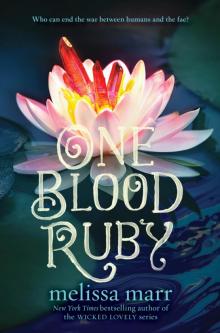 One Blood Ruby
One Blood Ruby Desert Tales
Desert Tales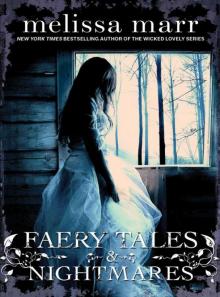 Faery Tales & Nightmares
Faery Tales & Nightmares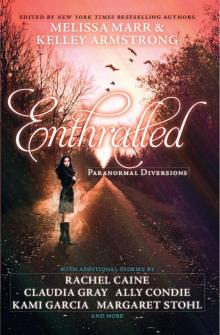 Enthralled: Paranormal Diversions
Enthralled: Paranormal Diversions Wicked Lovely
Wicked Lovely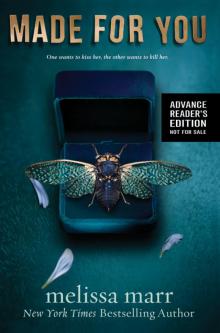 Made for You
Made for You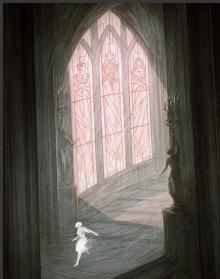 The Maiden Thief
The Maiden Thief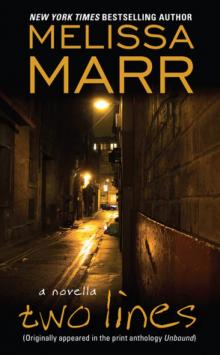 Two Lines
Two Lines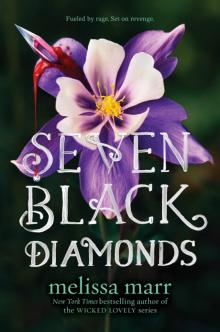 Seven Black Diamonds
Seven Black Diamonds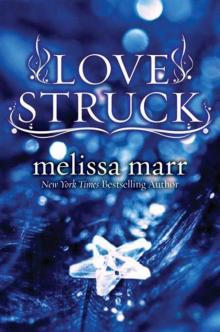 Love Struck
Love Struck Guns for the Dead
Guns for the Dead Radiant Shadows
Radiant Shadows Ink Exchange
Ink Exchange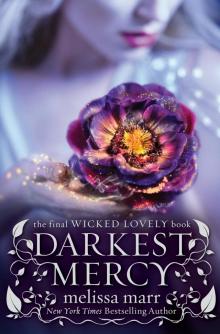 Darkest Mercy
Darkest Mercy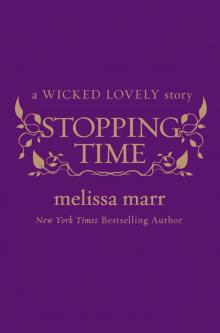 Stopping Time and Old Habits
Stopping Time and Old Habits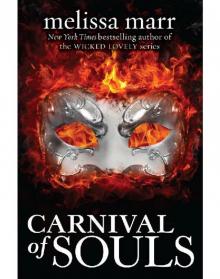 Carnival of Secrets
Carnival of Secrets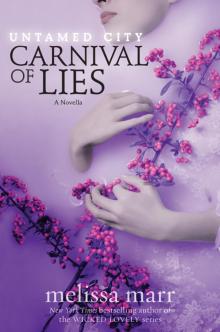 Carnival of Lies
Carnival of Lies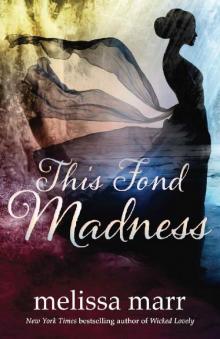 This Fond Madness
This Fond Madness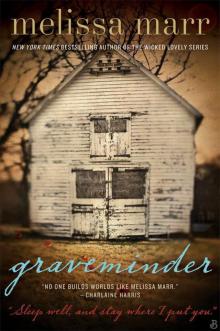 Graveminder
Graveminder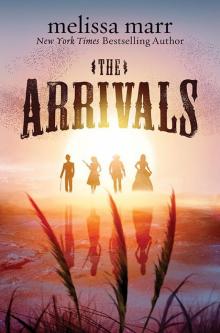 The Arrivals
The Arrivals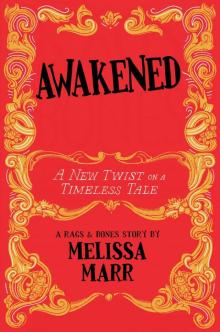 Awakened: A New Twist on a Timeless Tale
Awakened: A New Twist on a Timeless Tale Cold Iron Heart: A Wicked Lovely Novel
Cold Iron Heart: A Wicked Lovely Novel Summer Bound: A Wicked Lovely Story
Summer Bound: A Wicked Lovely Story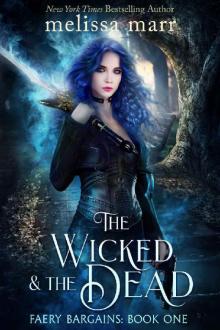 The Wicked & The Dead (Faery Bargains Book 1)
The Wicked & The Dead (Faery Bargains Book 1)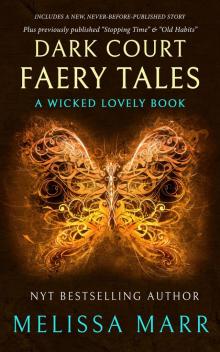 Dark Court Faery Tales
Dark Court Faery Tales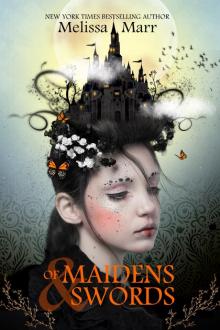 of Maidens & Swords
of Maidens & Swords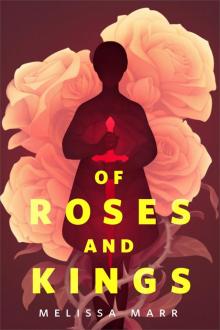 Of Roses and Kings
Of Roses and Kings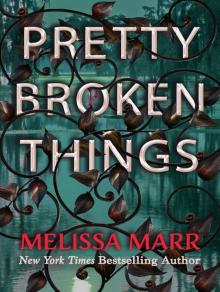 Pretty Broken Things
Pretty Broken Things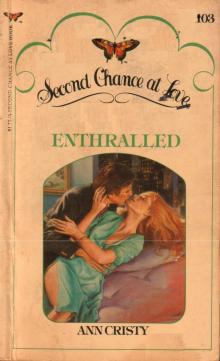 Enthralled
Enthralled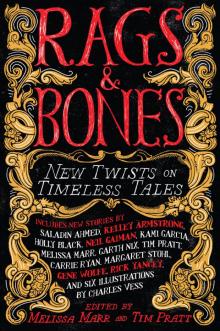 Rags & Bones
Rags & Bones Ink Exchange tf-2
Ink Exchange tf-2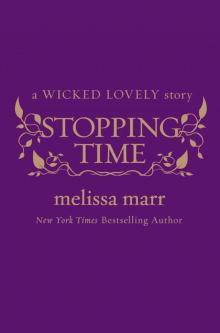 Stopping Time
Stopping Time Tales of Folk & Fey
Tales of Folk & Fey Hex on the Beach
Hex on the Beach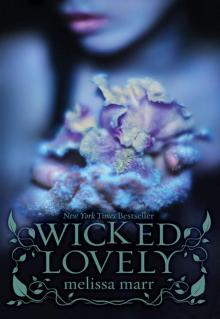 Wicked Lovely Free with Bonus Material
Wicked Lovely Free with Bonus Material Wicked Lovely tf-1
Wicked Lovely tf-1 Wicked Lovely with Bonus Material
Wicked Lovely with Bonus Material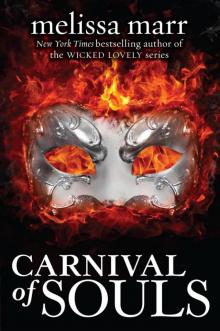 Carnival of Souls cos-1
Carnival of Souls cos-1 Radiant Shadows tf-4
Radiant Shadows tf-4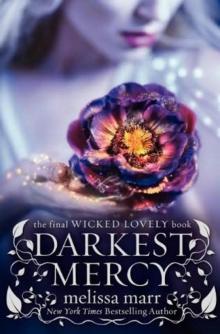 Darkest Mercy tf-5
Darkest Mercy tf-5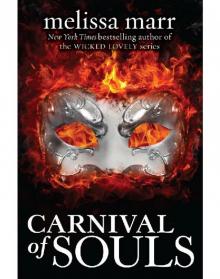 Carnival of Souls
Carnival of Souls Desert Tales: A Wicked Lovely Companion Novel
Desert Tales: A Wicked Lovely Companion Novel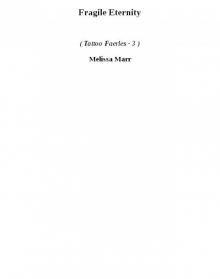 Fragile Eternity tf-3
Fragile Eternity tf-3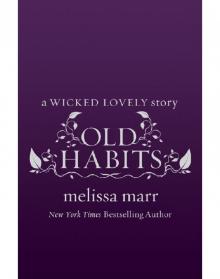 Old Habits
Old Habits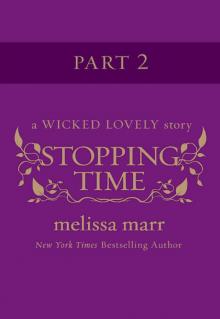 Stopping Time, Part 2
Stopping Time, Part 2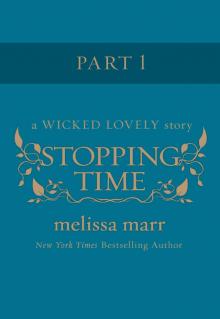 Stopping Time, Part 1
Stopping Time, Part 1